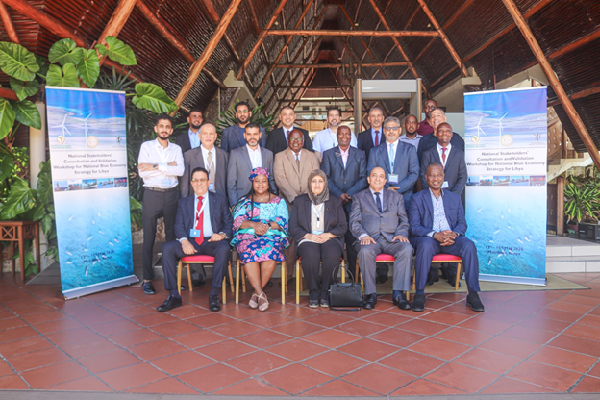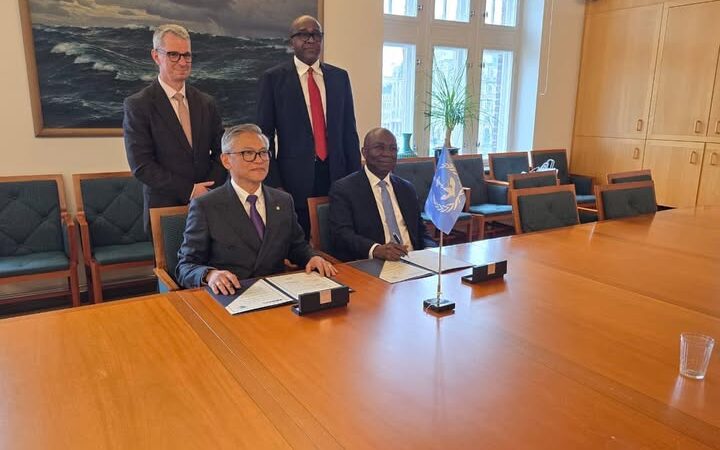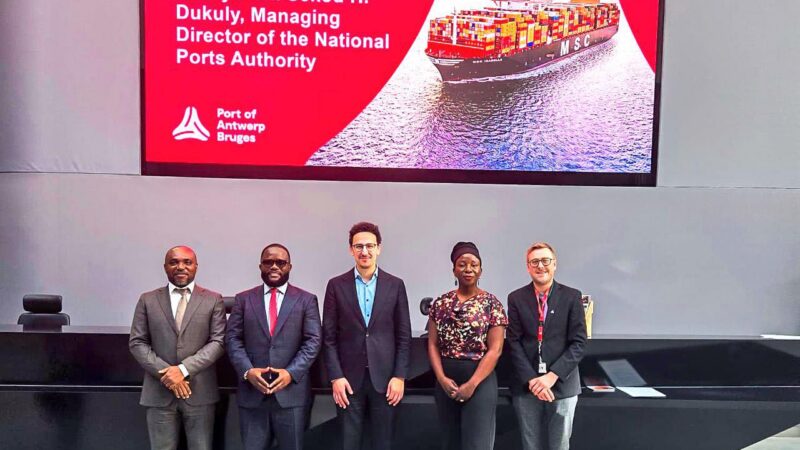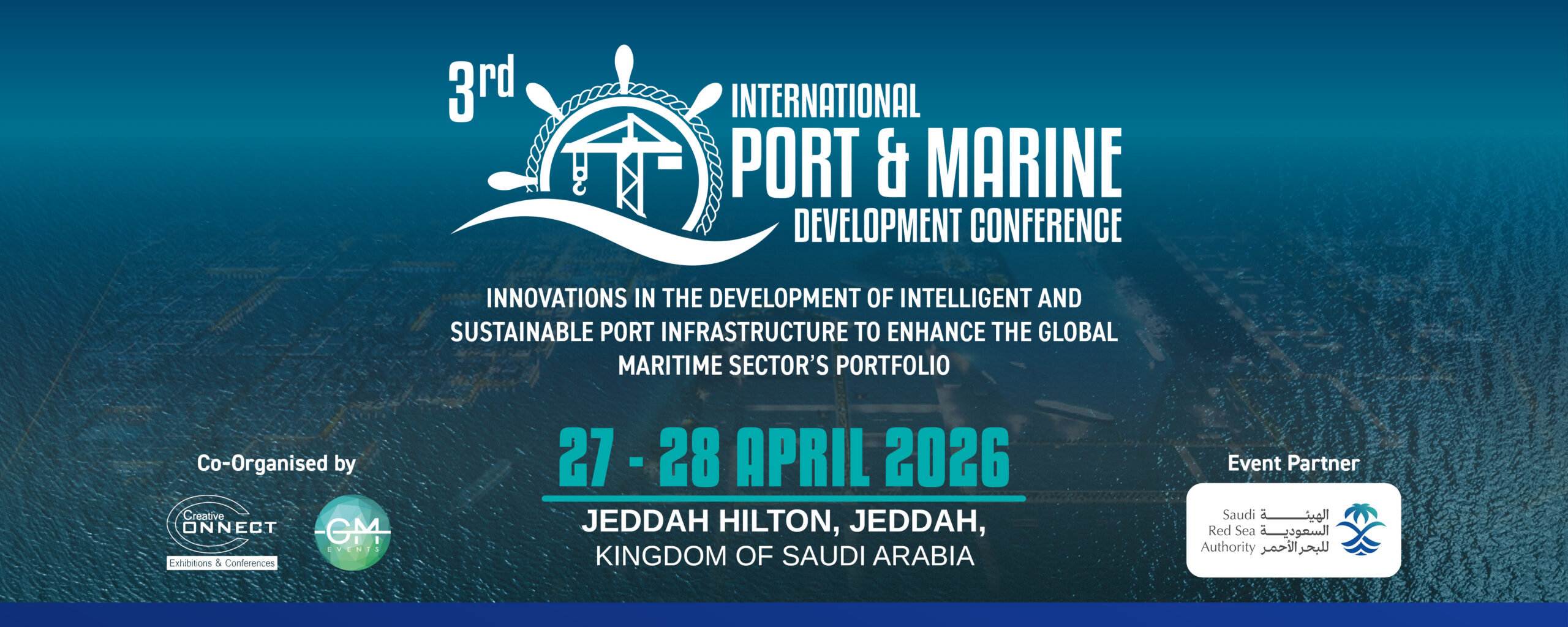Blueprints for Prosperity: Libya’s Blue Economy Strategy Shaped in Mombasa
The recent Stakeholders Consultative Workshop held in Mombasa, Kenya, marked a significant step towards the development of a National Blue Economy Strategy for Libya. Facilitated by Mr. Rafik Nouali, Fisheries and Aquaculture Resource Management Officer of AU-IBAR, and supported by various stakeholders, the workshop aimed to define priority issues and chart a roadmap for Libya’s blue economy development in alignment with the Africa Blue Economy Strategy (ABES). Participants of the workshop included representatives from various Libyan ministries, including Tourism, Economy & Trade, Marine Wealth, and Transport, along with experts and AU-IBAR staff, formed the diverse cohort of participants.
Key Highlights
The opening remarks by Mrs. Hellen Moepi-Guebama, Fisheries Officer representing the AU-IBAR Director, underscored the collaborative efforts between AU-IBAR, the Kingdom of Norway, and Libya. Emphasizing the importance of diversifying Libya’s economy beyond oil and gas, speakers highlighted the vast potential of Libya’s 1,900 km coastline for economic activities such as marine tourism, water resource management, fisheries, and aquaculture.
Engineer Ali Mohamed Ageli Shagrune and Dr. Adel Ahmed Faraj, representing the State of Libya, delivered the official opening remarks, underscoring the importance of leveraging the blue economy to foster economic diversification along Libya’s extensive 1,900 km coastline. Their focus was on reducing Libya’s reliance on oil and gas, the cornerstone of its economy. They highlighted opportunities in tapping into underground water reservoirs to bolster domestic, industrial, and commercial sectors.
During the deliberations, Minister of Tourism Mr. Nassraalden Alffazani, Mr. Matteo Bocci from the European Commission’s WestMED Initiative for Blue Economy, and Dr. Masuada Aboarisha, General Director of the Libya Project on Aquaculture, representing the EU West Mediterranean Maritime Clusters Alliance, commended AU-IBAR’s efforts in advancing the blue economy across Africa and specifically supporting Libya. They identified potential avenues for blue economy diversification in Libya, including marine tourism, water resource management (including desalination), and fisheries aquaculture, among others.
Objectives of the Workshop
The workshop aimed to solicit inputs from stakeholders to enrich the National Blue Economy Strategy for Libya and ensure broad ownership and political support. Specific objectives included identifying priority issues, refining the strategy’s thematic areas, establishing governance mechanisms, and promoting awareness and capacity building.
Technical Sessions
Technical Session 1, moderated by Mrs. Hellen Moepi-Guebama, provided an overview of the Africa Blue Economy Strategy (ABES) and its implementation plan. Dr. Patrick Karani elucidated ABES’s thematic areas and governance framework, sparking discussions on their relevance to Libya’s context.
Technical Session 2 delved into Libya’s blue economy sectors, with presentations covering fisheries, aquaculture, maritime transportation, ports, environment, and tourism. The ensuing discussions identified thematic areas for the National Blue Economy Strategy, emphasizing the need for innovative financing, waste management, capacity building, and addressing challenges such as:
1. Economic Diversification: Libya’s heavy reliance on oil and gas poses a significant challenge to diversifying the economy. Participants stressed the importance of developing alternative revenue streams through the blue economy to reduce dependency on hydrocarbons.
2. Environmental Pollution: Pollution, particularly plastic and solid waste, emerged as a pressing issue affecting Libya’s coastline and the Mediterranean Sea. Strategies for effective waste management and pollution control were deemed essential for sustainable blue growth.
3. Human Resource Development: Capacity building and empowerment of youth and women were identified as crucial for driving blue economy initiatives. Participants emphasized the need for training programs and skill development to harness Libya’s maritime potential effectively.
Emerging Issues and Recommendations
In addition to the challenges highlighted, participants put forth the following recommendations:
1. Integrated Approach: A holistic approach to blue economy development, integrating environmental, social, and economic considerations, was deemed necessary for sustainable growth.
2. Stakeholder Collaboration: Enhanced coordination among stakeholders, including government agencies, private sector entities, and civil society organizations, was recommended to foster synergy and maximize impact.
3. Data Collection and Research: There was a consensus on the importance of robust data collection and research to inform evidence-based policymaking and investment decisions in blue economy sectors.
4. Innovative Financing Mechanisms: Exploring innovative financing mechanisms such as blue bonds and public-private partnerships (PPPs) was suggested to mobilize funds for blue economy projects and initiatives.
Outcomes and Next Steps
Working groups formulated drafts of the National Blue Economy Strategy, Implementation Plan, and Governance Coordination Mechanism. The next steps involve disseminating the draft strategy for broader feedback and validation, marking a crucial phase towards realizing Libya’s blue economy potential. The Stakeholders Consultative Workshop stands as a cornerstone in shaping Libya’s trajectory towards a resilient and prosperous blue economy. It underscores the paramount importance of collaboration, innovation, and inclusive policymaking in laying the groundwork for sustainable growth. As participants come together, they pave the way for a future where strategic partnerships and forward-thinking initiatives propel Libya towards economic vitality and environmental stewardship in its maritime endeavors.
Source : AU-IBAR






